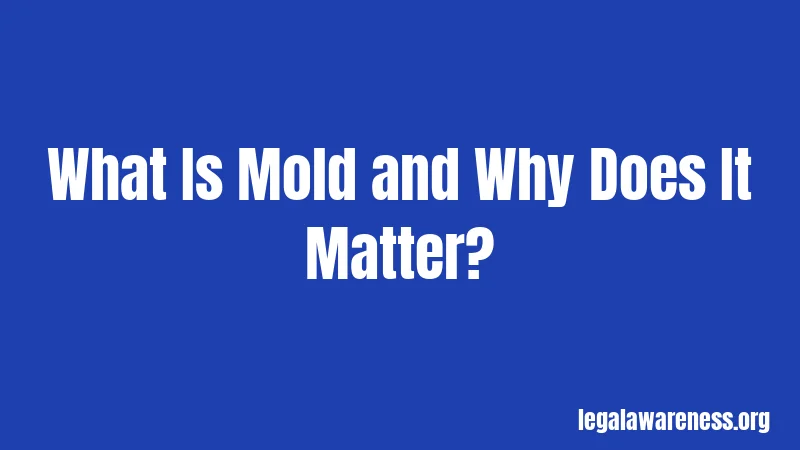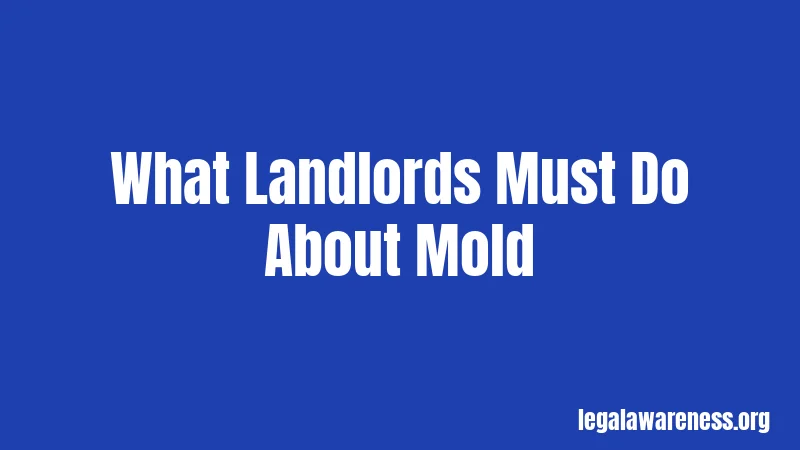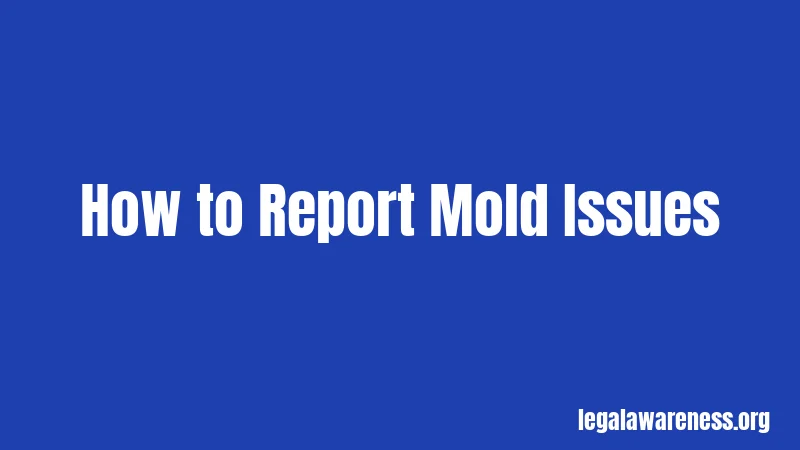Pennsylvania Mold Laws (2026): What Homeowners and Renters Must Know
Most people have no idea mold is regulated by law. But in Pennsylvania, mold can actually create serious legal issues for property owners and landlords. The rules might surprise you. Let’s break down exactly what you need to know about mold laws in Pennsylvania.
Pennsylvania takes mold seriously because it affects people’s health and property values. If you’re a homeowner, landlord, or renter, understanding these laws protects you. Honestly, this is one area where knowing the rules can save you thousands of dollars.
What Is Mold and Why Does It Matter?

Think of mold as a fungus that grows where there’s moisture. It thrives in damp, dark spaces like basements and bathrooms. Mold spreads through tiny spores you can’t see. It damages buildings and can make people sick.
Pennsylvania cares about mold because it causes real problems. Health issues range from allergies to serious respiratory problems. Property damage can be extensive too. That’s why there are laws protecting people from dangerous mold situations.
Pennsylvania’s Mold Disclosure Laws
Here’s where it gets important. In Pennsylvania, sellers must disclose mold issues when selling a property. If you’re buying a home, sellers have to tell you about known mold problems. Pretty straightforward, right?
But wait, there’s more to know. Landlords must also disclose mold to tenants before they sign a lease. This applies to apartments, rental homes, and commercial spaces. If mold exists and the landlord knows about it, they have to tell you. No surprises allowed.
The law doesn’t require sellers or landlords to fix mold before disclosure. They just have to be honest about its presence. Think of it like transparency insurance. You’re protected by knowing what you’re getting into.
What Landlords Must Do About Mold

Not sure what landlords are legally responsible for? Let me break it down.
Landlords in Pennsylvania must maintain habitable living conditions. This includes keeping mold under control. If moisture gets into walls or creates mold growth, that’s the landlord’s problem to fix. You’re not responsible for problems caused by building defects.
Here’s the catch. Landlords need to fix mold issues caused by building problems or maintenance failures. But they’re not responsible if you caused the mold through your own behavior. For example, if you leave water running and it damages the apartment, that’s on you.
The law requires landlords to respond to mold complaints. If you report mold and the landlord ignores it, they’re breaking the law. You can take action through Pennsylvania’s tenant rights laws. This includes withholding rent or breaking your lease.
Landlords must also prevent mold growth by maintaining proper ventilation and managing moisture. They need to fix leaks quickly and keep the property dry. Prevention is literally part of their legal duty.
Your Rights as a Tenant in Pennsylvania
Okay, pause. This part is important if you’re renting.
Tenants have significant rights when it comes to mold. You have the right to a habitable space. Mold that creates health risks violates that right. Pennsylvania law protects you here.
If you discover mold, you can request repairs in writing. Give your landlord a reasonable time to fix it, usually seven to fourteen days depending on severity. Document the mold with photos and dates. Keep copies of everything you send to your landlord.
What if the landlord does nothing? You have options. You can contact your local health department. You can also break your lease without penalty if mold makes the space uninhabitable. Some tenants successfully withhold rent until repairs are made, but check with a lawyer first on this approach.
You’re also protected from retaliation. If your landlord tries to evict you for reporting mold, that’s illegal. Pennsylvania law specifically protects tenants who assert their rights. Stand firm on this one.
How to Report Mold Issues

Found mold in your rental? Here’s what you need to do.
First, document everything. Take photos and videos of the mold. Note the location, size, and when you first noticed it. Write down any health symptoms you or your family have experienced. This creates a record.
Second, notify your landlord in writing. Email is good, but certified mail is better. Be specific about where the mold is and how bad it is. Include your photos. Give a reasonable deadline for repairs, usually five to ten business days.
Third, if nothing happens, contact your local health department. Pennsylvania counties have health offices that inspect mold complaints. They can pressure landlords to fix problems. Their involvement adds authority to your complaint.
You can also contact Pennsylvania’s Department of Consumer Protection. They handle tenant complaints and have enforcement power. Your call could trigger an investigation. This works, honestly.
Keep copies of all communications. You’ll need this documentation if things go to court. Make it easy to prove you complained and the landlord ignored you.
Homeowners and Mold Responsibility
Own your home? You have different responsibilities than renters.
Homeowners are responsible for mold on their property. You’re liable for damage it causes to others. If mold spreads to a neighbor’s home, you could face legal action. Insurance and liability become important here.
Hiding mold during a sale is a bad idea. Really bad. If a buyer discovers mold after closing, they can sue for non-disclosure. Courts have sided with buyers in these cases. The costs go way beyond just fixing mold.
You need to maintain your property to prevent mold. This means fixing leaks, managing moisture, and ensuring proper ventilation. Regular maintenance is your best defense. Prevention is way cheaper than dealing with lawsuits.
Before selling, get a mold inspection. It’s inexpensive and protects you. Knowing about mold problems lets you address them honestly. This approach avoids legal trouble down the road.
Mold Testing and Professional Remediation
Sound complicated? It’s actually pretty straightforward.
Pennsylvania doesn’t have specific laws requiring mold testing. But if you suspect serious mold, testing is smart. A certified mold inspector can identify hidden mold. They document everything professionally.
If mold is found, hire a professional remediation company. They’ll remove the mold properly and fix the moisture source. Trying to clean it yourself usually doesn’t work for serious cases. Professional removal includes proper containment and disposal.
Here’s the important part. Keep all records of mold testing and remediation. If you ever sell the home, these documents prove you handled the problem correctly. They protect you legally.
Insurance might cover mold remediation if water damage caused it. Check your homeowner’s policy. Some policies exclude mold damage, so know what you’re covered for. Call your agent and ask specifically about mold.
Health Standards and Mold Exposure
You’re probably wondering about health risks. That makes sense.
Pennsylvania doesn’t have a specific legal mold limit for indoor air. Most states don’t actually. But the concept is simple: if mold creates health hazards, it’s a problem. Your health matters more than technicalities.
Mold exposure can cause allergies, asthma attacks, and respiratory infections. People with weak immune systems are extra vulnerable. Children and elderly residents face higher risks. These health impacts are why laws exist.
If you’re experiencing symptoms like persistent coughing or difficulty breathing, take it seriously. Document when symptoms started and how they relate to mold discovery. This connection matters legally if you need to leave the property.
Health departments use their own standards to determine if mold is hazardous. Their inspectors know what constitutes a health threat. If they say it’s a problem, that carries legal weight in disputes with landlords.
Recent Changes and Updates to Pennsylvania Mold Laws
Pennsylvania updated its tenant protection laws in recent years. The focus now is stronger enforcement of habitability standards. Mold specifically falls under habitability requirements. Landlords face real consequences for ignoring complaints.
The state has also increased penalties for landlords who retaliate against tenants. If you report mold and face eviction, you have stronger legal protection now. Courts take retaliation cases seriously.
What’s changed most is enforcement. Local health departments have more resources to inspect mold complaints. They can actually pressure landlords to comply. This means reporting mold now has real teeth.
Penalties for Violating Mold Laws
Let’s talk about what happens when someone breaks mold laws.
Landlords who fail to disclose mold face civil penalties. If a tenant sues successfully, the landlord can owe damages. This includes actual costs to fix the mold plus compensation for health issues. Costs add up fast.
Landlords who retaliate against tenants face penalties up to $2,500 or more. A court can also allow the tenant to break the lease penalty-free. Retaliation is taken seriously in Pennsylvania. Don’t mess with this.
Homeowners who hide mold during sales can face buyer lawsuits. The buyer might win money for remediation, health problems, or diminished property value. These cases often result in settlements in the thousands of dollars.
If a landlord ignores multiple mold complaints, the tenant can withhold rent. This is legal in Pennsylvania when there’s a habitability violation. The tenant puts rent money in escrow. The landlord must fix the problem to get the money back.
Special Circumstances and Exceptions
Here’s where things get nuanced.
If you caused mold through your actions, that’s different. Leaving windows open during heavy rain? Your fault. Not using the bathroom exhaust fan? Your responsibility. Landlords aren’t liable for tenant-caused mold. But if the building itself has moisture problems, that’s on the landlord.
Water damage from natural disasters is complicated. Generally, homeowner’s insurance covers weather-related water damage. Mold from storms might be covered too. Check your specific policy language. Some exclude mold even when water damage is covered.
Tenants in subsidized housing have the same mold protections. Low-income housing is still required to meet habitability standards. Mold is a habitability violation regardless of rent amount. Everyone deserves a safe home.
What to Do if You Have a Mold Problem
Okay, here’s the action plan.
Step one is assessment. Determine the mold size and location. Small surface mold is different from widespread mold in walls. Assess whether it’s affecting your health. Be honest about the severity.
Step two depends on if you rent or own. Renters should document and notify the landlord immediately. Owners should call a professional inspector. Don’t ignore mold hoping it goes away. It never does.
Step three is documentation. Take photos and keep records. Write down dates and conversations. This becomes crucial if disputes arise later.
Step four is follow-up. If you’re renting and the landlord delays, escalate to health department. If you own and mold gets worse, hire remediation. Taking action protects you legally.
Step five is prevention. Fix leaks immediately. Improve ventilation. Keep humidity below 50%. Prevent moisture accumulation. An ounce of prevention beats a lawsuit later.
Frequently Asked Questions
Does Pennsylvania require mold inspections before selling a home? No specific inspection requirement exists. But sellers must disclose known mold. Getting an inspection before sale prevents legal problems later.
Can a landlord charge tenants to remove mold? No. Mold removal from building defects is the landlord’s responsibility. Tenants can’t be charged unless they caused the mold themselves.
What’s the normal timeline for a landlord to fix mold? Reasonable repair times vary by severity. Usually five to fourteen days is considered reasonable for minor issues. Emergency situations with health threats demand faster response.
Is black mold more regulated than other mold types? Not specifically. Pennsylvania law treats all mold that affects habitability the same way. The type doesn’t matter as much as whether it creates hazards.
Can I break my lease if there’s mold? Yes, if mold makes the space uninhabitable and the landlord refuses to fix it. You can break the lease without penalty. Document the problem first.
Final Thoughts
Now you know the basics about Pennsylvania mold laws. Whether you’re renting or owning, understanding these rules protects you. Mold isn’t something to ignore or hope disappears. It’s a legal issue that matters.
The key takeaway is simple: disclose mold, fix mold, and report mold problems promptly. Everyone deserves a healthy, safe living space. Pennsylvania law backs that up. When in doubt, contact your local health department or speak with a lawyer. They can guide you through specific situations.
Stay informed, stay healthy, and take mold seriously. Your home and your health are worth the effort.
References
Pennsylvania Residential Tenants Act Pennsylvania Department of Consumer Protection Pennsylvania Department of Health EPA Mold Resources and Guidance Pennsylvania Housing Authority Tenant Rights
